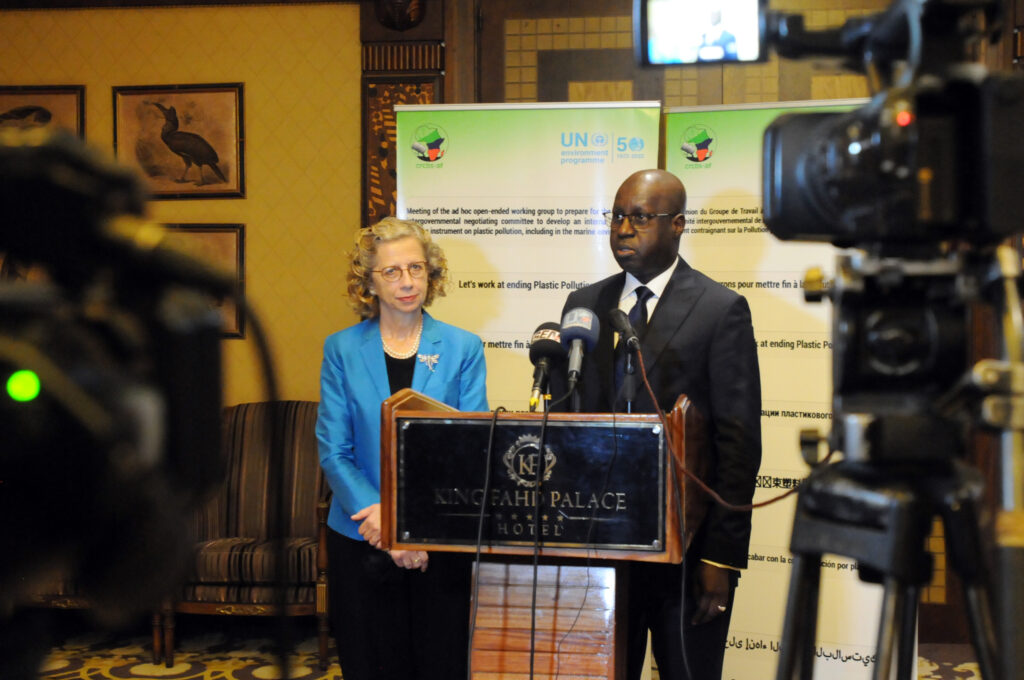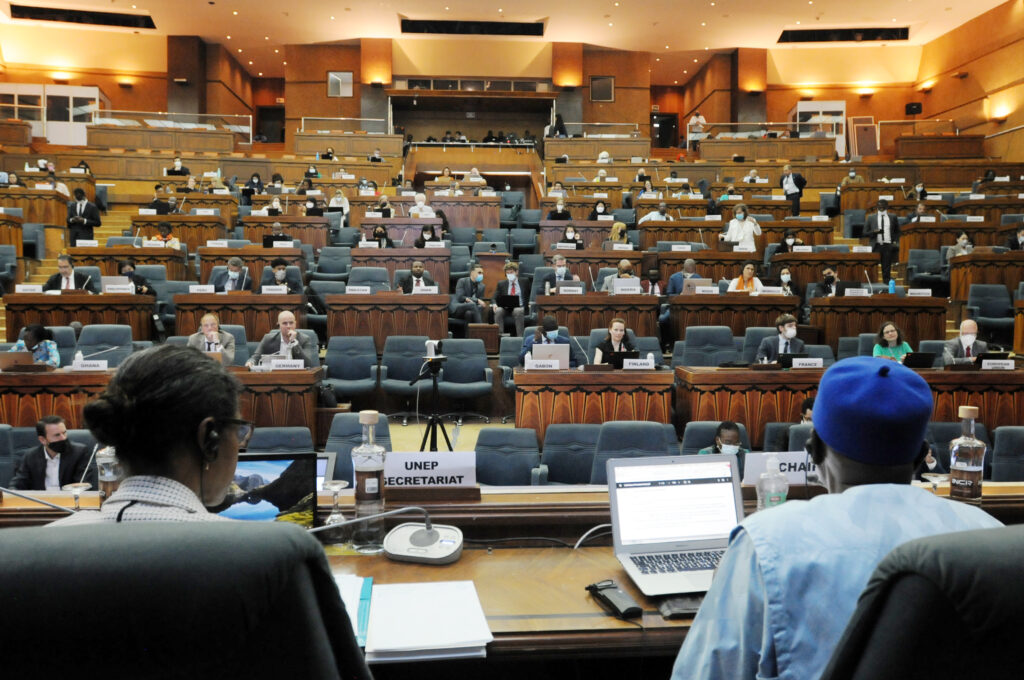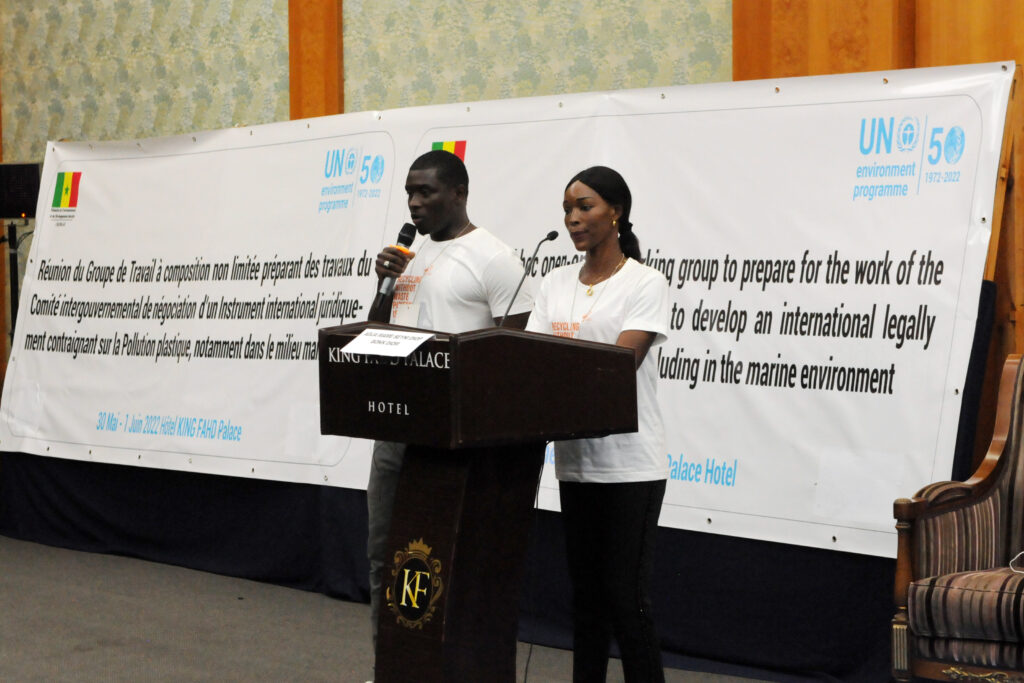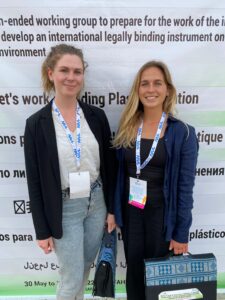Insights from the ad hoc open‑ended working group preparing for the Intergovernmental Negotiating Committee on plastic pollution

Inger Andersen, Executive Director, UNEP, and Abdou Karim Sall, Minister for the Environment and Sustainable Development, Senegal. Photo by IISD/ENB | Diego Noguera
From May 29. to June 1. 2022, state representatives, civil society, and businesses came together in Dakar, Senegal for an ad hoc open-ended working group (OEWG) to develop a pathway towards ending plastic pollution. Following the successful resumed fifth session of the United Nations Environment Assembly (UNEA-5.2), which saw the acclaimed adoption of the resolution “End plastic pollution: Towards an international legally binding instrument”, the OEWG laid the groundwork for the Intergovernmental Negotiating Committee (INC) to develop a legally binding agreement on plastic pollution by the end of 2024. In this story, researchers from the Norwegian Institute for Water Research (NIVA) share insights on key developments from the OEWG.
The OEWG meeting in Dakar
The historical resolution adopted during UNEA 5.2 in March 2022 addresses the full life cycle of plastics, from production to end-of-life disposal. The need for an “overall system change” that addresses the full life cycle of plastics, from the extraction of raw materials, product design and manufacturing, to distribution, use and environmentally sound waste management, was reasserted by Inger Andersen, Executive Director of the UN Environment Programme ahead of the OEWG.
As the OEWG kicked off at the King Fahd Palace in Dakar, government delegates, NGOs, and business representatives deliberated intensely on the ambitious timetable towards a draft agreement, highlighted information needs in the leadup to the first INC, and discussed the ways in which participation, inclusion, and transparency can be ensured to enable a just transition and circular plastics economy.
To support the objective of an inclusive and transparent negotiation process, multi-stakeholder dialogues (MSDs) accompanied the plenary sessions and provided a stage for stakeholders to come together to raise and debate issues related to plastic pollution, its impacts and potential solutions, and to envision what the future agreement could look like. In particular, the MSDs revolved around innovation across the plastic life cycle, the risks associated with the chemical contents of plastics, and the need for an increasingly inclusive, just, and environmentally sound management of plastic waste.

A view of the room from the dais (Photo by IISD ENB – Diego Noguera)
Inclusive and just transition to a plastic pollution-free economy
The UNEA-5.2 mandate calls for the “widest and most effective participation possible”, both in the OEWG and INC. How to ensure meaningful participation and effective stakeholder involvement in the negotiations was widely discussed in the MSDs, and the need for a “just and inclusive transition” was reiterated by delegates in plenary and informal group discussions on multiple occasions. Key in this regard is the inclusion of the knowledge and perspectives of the people who are most vulnerable to plastic pollution, as well as of those who are key to addressing leakages across the plastic value chain.
For instance, waste pickers have historically been marginalized in waste management decision-making despite often constituting the foundation of recycling systems in many parts of the world. Yet, as the Global Alliance of Waste Pickers is making clear, “recycling without waste pickers is garbage”. During the OEWG, representatives from the Global Alliance of Waste Pickers and from the Senegalese waste picker association Bokk Diom were particularly visible, as they advocated for the rights and representation of “waste pickers and recyclers in informal and cooperative settings”. The changing tide around informal waste and recycling workers was also evident as several delegations stated the importance of including their views and fostering their active participation in the negotiations towards the future plastics treaty.
Recognizing the need for engaging waste pickers and recyclers under informal and cooperative settings, indigenous people, children, youth and women in the negotiation process has been a particularly remarkable achievement of the OEWG. However, a funding mechanism to ensure meaningful and active participation, particularly for waste pickers, has yet to be established.

Ibrahima Mbaye and Adja Mame Seyni Diop, Bokk Diom. Photo by IISD/ENB | Diego Noguera
Should a plastic treaty address chemicals?
The issue of hazardous chemicals and toxins throughout the plastics value chain and the complexities of addressing this issue received particular attention during the OEWG. Despite actions being taken to limit the use of persistent organic pollutants and other hazardous substances through existing multilateral agreements such as the Basel, Stockholm and Rotterdam Conventions, certain plastic products continue to contain combinations of chemicals which may be hazardous and pose risks to human health and the environment.
During the MSDs, the International Pollutants Elimination Network (IPEN) hosted a technical briefing on “Health, Chemicals, Plastics and a Non-Toxic Circular Economy”, co-sponsored by the governments of Senegal, Switzerland, and Uruguay. Raising concern for the risks of hazardous chemicals, such as endocrine-disrupting substances contaminating recycled plastic waste streams, the side-event concluded with IPEN General Manager Björn Beeler stating, “we really see a plastic treaty as a health treaty”.
This sentiment was echoed throughout the OWEG, as several delegates expressed a need to better understand the chemical content of plastic products. Mexico for instance, expressed desire for the future instrument to include specific measures for plastics that “due to their chemical structure and additives, present particular risks to the environment and human health”. The Norwegian representative stated similar concerns and requested an overview of the current state of knowledge for the use of chemicals in plastics and the associated risks to human health.
Another key outcome of the OWEG with relevance to chemicals and plastics was the request for the INC secretariat to prepare a document on “Plastics science – monitoring, sources of plastic pollution, chemicals used in manufacturing, flows across the life cycle, pathways in the environment, health and other impacts, solutions, technologies and costs”, in time for the first INC at the end of 2022.
Reflections and way forward
Following daily plenary sessions and MSDs, informal negotiations continued until late into the night. Covering multiple aspects of the issue, OEWG discussions have set the stage for ambitious yet complex negotiations in the years to come; negotiations that will hopefully pave the way for a plastic treaty that can systemically change the plastics value chain, in a just transition towards ending plastic pollution.
Hearing delegates echoing commitments to explicitly recognize valuable perspectives from informal waste pickers and recyclers, civil society organizations, and indigenous people at every stage of the negotiations was encouraging and much welcomed. However, ways of facilitating active participation of too often marginalized actors have yet to be clearly determined. In this regard, the Aarhus Convention and the Escazu agreement may be used as starting points for promoting public participation in the leadup to the future global treaty.
In Dakar, noteworthy progress was achieved in finalizing the draft rules of procedure for the INC, and in proposing a timetable for five INC meetings as well as documents to be developed in the leadup to the first INC in Uruguay later this year. In the wake of the OEWG, it will certainly be exciting to follow the unfolding negotiations towards finalizing a draft plastic treaty by the end of 2024.
Written by Emmy Nøklebye and Idun Rognerud, Norwegian Institute for Water Research (NIVA). Any questions can be sent to emmy.noklebye@niva.no and idun.rognerud@niva.no.

Researchers Idun Rognerud (left) and Emmy Nøklebye (right) at the OEWG in Dakar. Photo by NIVA